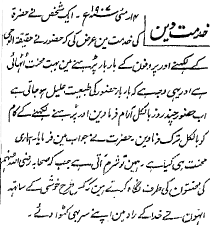Importance of Sadr Anjuman Ahmadiyya
In Al-Hakam of 10th September 1907 there is an article on the front page which shows the important position held by the Sadr Anjuman Ahmadiyya as created by Hazrat Mirza Ghulam Ahmad. It is written by the Editor, Shaikh Yaqub Ali Turab, later a staunch supporter of Mirza Mahmud Ahmad. I quote most of it below:
“Today, not for the first time, but for several years I have been urging that the organised Ahmadi community, just as it is bound in a spiritual relationship, should also be united in a physical sense. It was not me who felt this need but it was felt by the Promised Messiah the very day he announced the arrangements of taking the bai`at by the order of Allah. For the attainment of the benefits that God intends should come through the founding of this Movement, it is necessary to have an organised system. Many a time, moves were proposed for this, and they had some effect. Ultimately, this tree was planted in the form of the Sadr Anjuman Ahmadiyya by order of the Promised Messiah.
By its nature, the Sadr Anjuman Ahmadiyya requires that there should be associated with it other Anjumans as its subordinates. For this the Secretary of the Sadr Anjuman Ahmadiyya [Note: This was Maulana Muhammad Ali] has made regular proposals, and done so several times. To fulfil the needs of the community, and to attain the aims and objectives which God has connected with the establishment of this community, it is essential that there must be Ahmadiyya Anjumans in various places and a proper register of members of the Movement. The Sadr Anjuman Ahmadiyya has prepared and printed the necessary rules and regulations for Ahmadiyya Anjumans, and sent copies of these to various places. Those who need more of them should apply to the office of the Secretary, Sadr Anjuman Ahmadiyya, and obtain them, and very soon inform that they have created Anjumans under these rules.
When organised Anjumans are established, those problems and difficulties that arise daily will not arise again because the community as a whole will be aware of those problems and will have the opportunity to devise and act on proposals to meet the arising needs.”


According to an article published by BBC Urdu the total number of Ahmadiyya community in India is One hundred thousand.…
----Jul 27, 18:49